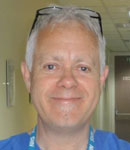 What route has your career taken to get you where you are today?
What route has your career taken to get you where you are today?
I was asked to talk for an hour on this a few years ago and illustrated my career as a piece of unfinished, multi-coloured knitting. The various strands of my work have interwoven without a neat or recognizable pattern, but have reinforced and linked with each other to make something that I hope is strong, coherent and useful.
I qualified BChD (hons) from Leeds in 1984 and was inspired and encouraged by teachers to pursue a clinical academic career. Early years were dominated by clinical experiences and Royal College Fellowship examinations, before immersing myself in a full-time microbiology PhD at Edinburgh Medical School from 1986-99. During that time, I married Janet, who has supported and carried me every step of the way. We came to Newcastle for 1 year in 1999 to consolidate clinical skills and have stayed ever since. My career has been marked by unexpected interactions and opportunities, and I could list many individuals and organisations that have inspired, encouraged and cajoled me at key moments. Professor Ian Barnes first drew me into Endodontology and taught me the value of international collaboration during 2 weeks of orientation in the Netherlands, while the British and European Endodontic Societies gave me opportunities to teach and share enthusiasms. Professor Robin Seymour granted me a 6 month sabbatical at the University of Texas, San Antonio and unlocked clinical and scholarly collaborations that have been foundational. Numerous editors have chosen to involve me in established textbooks, and a succession of bright and able researchers have allowed me to collaborate on a broad patchwork of projects. In all of this, I have been conscious of the privileges of public service, the joys of working every day with bright and enquiring students and providing the best clinical services possible for members of the public. There really hasn’t been much premeditated planning, but my career has been defined by the people who have supported, linked and opened doors. And as I approach my concluding chapter of paid employment, I’m conscious more than ever of the opportunities I need to facilitate for others.
What do you find most challenging about working in HE learning and teaching?
Keeping the plates spinning. The conflicting demands of Consultant clinical practice, undergraduate and postgraduate education, pastoral care, engagement, personal and supervised research, in addition to national and international scholarly and administrative roles sometimes feels like a circus act. But there are two ways of looking at it – that you’re not as good as you’d like to be in any of your roles, or that you’re privileged to have a varied and interesting career with at least one element going well at all times. Challenge isn’t always a bad thing, it motivates, energises and leaves you without a dull moment. And it’s important to remember that we’re public servants, paid by the tax payer to work hard and serve to the best of our abilities in our various roles. It’s also worth remembering that it is me who has not yet learned to say no.
What’s the best thing you’ve been involved in since you started working with Newcastle University?
That’s quite easy. The School of Dental Sciences in Newcastle is a close-knit, engaged and vibrant community that respects diverse skill sets and treats people as valuable human beings. It is a deep privilege, every day, to be part of a positive and constantly evolving team, to be appreciated and appreciate others in all of our diverse roles.
What’s the wisest piece of advice you’ve received from a mentor or colleague?
Always prepare, no matter how well acquainted you are with the subject.
To prepare well is to recognise and honour those we are serving, both in terms of teaching materials and the spirit in which we conduct ourselves.
What’s your top educational research interest?
My first is to understand more fully the spiralling levels of anxiety, depression and low self esteem that are robbing so many dazzling young people of their formative years. Unlocking the individual and societal factors at play will be a lengthy task but one in which those involved in the nurture of young people should be interested.
I’m also greatly engaged in skills acquisition, and how best to develop the refined personal and tactile skills required to deliver exacting operative procedures. Nowhere is that more so than in clinical endodontology, and exciting developments in digital imaging, including haptic simulation may hold exciting opportunities for the future.
If you could have dinner with 3 famous people from history who would they be?
If I’m honest, I’d be quite happy to have dinner in the back garden, on a warm evening, with my wife and two grown-up kids – a rare privilege these days.
I imagine dinner involving Jesus of Nazareth, CS Lewis and Ötzi, the iceman of Bolzano may be enlightening. We should need a team of translators and food consultants and a space outside for CS Lewis to light-up between courses.
John Whitworth
Professor of Endodontology/hon Consultant in Restorative Dentistry
Director of Student Progress and Support
Engagement Lead
School of Dental Sciences
